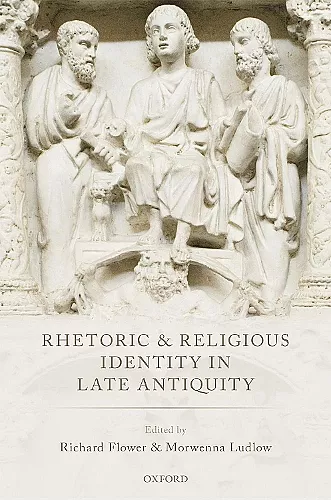Rhetoric and Religious Identity in Late Antiquity
Richard Flower editor Morwenna Ludlow editor
Format:Hardback
Publisher:Oxford University Press
Published:31st Aug '20
Currently unavailable, and unfortunately no date known when it will be back

The topic of religious identity in late antiquity is highly contentious. How did individuals and groups come to ascribe identities based on what would now be known as 'religion', categorizing themselves and others with regard to Judaism, Manichaeism, traditional Greek and Roman practices, and numerous competing conceptions of Christianity? How and why did examples of self-identification become established, activated, or transformed in response to circumstances? To what extent do labels (whether ancient and modern) for religious categories reflect a sense of a unified and enduring social or group identity for those included within them? How does religious identity relate to other forms of ancient identity politics (for example, ethnic discourse concerning 'barbarians')? Rhetoric and Religious Identity in Late Antiquity responds to the recent upsurge of interest in this issue by developing interdisciplinary research between classics, ancient and medieval history, philosophy, religion, patristics, and Byzantine studies, expanding the range of evidence standardly used to explore these questions. In exploring the malleability and potential overlapping of religious identities in late antiquity, as well as their variable expressions in response to different public and private contexts, it challenges some prominent scholarly paradigms. In particular, rhetoric and religious identity are here brought together and simultaneously interrogated to provide mutual illumination: in what way does a better understanding of rhetoric (its rules, forms, practices) enrich our understanding of the expression of late-antique religious identity? How does an understanding of how religious identity was ascribed, constructed, and contested provide us with a new perspective on rhetoric at work in late antiquity?
The strongest essays of this collection are those that work with a clear set of definitions and methods. Part One is by far the most useful section of the book and will repay the attention of readers since issues of identity and rhetoric are at the forefront. * Harry O. Maier, Vancouver School of Theology, ARYS: Antiquity, Religions and Societies *
rhetoric and Religious Identity in Late Antiquity instructs with rich insights, delights with its wide array of subjects, and ultimately proves persuasive of its core argument about rhetorical representation among late antique religions. * Mark Clavier, Augustiniana *
In many cases, the essays break down dichotomies and remind us to be careful when trying to fit people or texts into particular categories of religious identity. The editors' goal was to study rhetoric in order to better understand religious identity and vice-versa, and the volume succeeds on both counts. * Jaclyn Maxwell, Bryn Mawr Classical Review *
This volume will be essential reading for scholars concerned with East-West cultural interactions. * Jenny Strauss Clay, University of Virginia, Religious Studies Review *
The volume,...successfully accomplishes what the editors promised in the first chapter and delivers a collection of contributions replete with rich sources and insightful approaches to understand how rhetoric and religious identities interacted. * Alberto J. Quiroga Puertas, GNOMON 95 *
ISBN: 9780198813194
Dimensions: 241mm x 162mm x 22mm
Weight: 604g
300 pages